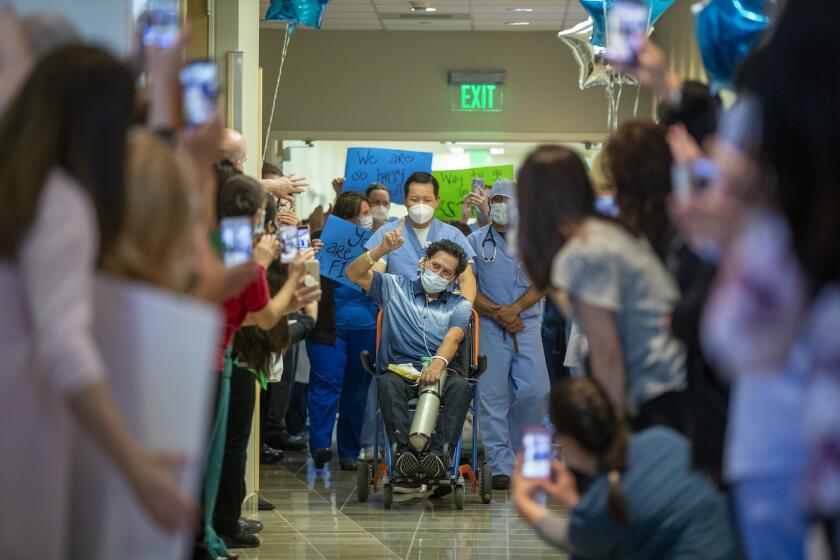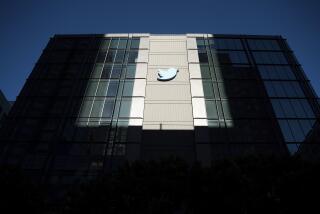California to provide more help for the unemployed and immigrants amid coronavirus

- Share via
SACRAMENTO — California is expanding hours at its call center that handles unemployment insurance and preparing to expedite benefits to independent contractors in response to a record number of people who are out of work and seeking government help as a result of the COVID-19 pandemic.
Gov. Gavin Newsom discussed the efforts Wednesday and noted that 2.7 million Californians had filed for unemployment benefits in the last month, after businesses across the state shuttered under his stay-at-home order and the economy tanked. Newsom also announced a $125-million relief effort to help roughly 150,000 Californians without legal immigration status.
“We are in the process, right now, of dealing with an unprecedented number of people making phone calls to our Employment Development Department,” Newsom said. “We’re trying to process these applications and we’re trying to turn around those applications in real time.”
These are some of the unusual new scenes across the Southland during the coronavirus outbreak.
Newsom acknowledged the dire economic consequences of his efforts to curb the death toll from the coronavirus this week and unveiled a set of criteria the state intends to meet before gradually easing the restrictions and allowing businesses to begin to reopen.
The efforts to more quickly distribute benefits to struggling Californians come after criticism that the state is lagging behind.
Assemblyman Jim Patterson (R-Fresno) said Wednesday that other states, including Michigan and New York, had already begun sending out benefits to independent contractors and the self-employed.
California, he said, has acted “way too slowly. They are behind a lot of other states.”
Patterson said dozens of constituents had called his office seeking help.
“I have never seen anything like this or heard the stories of fear and desperation,” Patterson said.
Newsom’s comments came a day after state Labor Secretary Julie Su announced that a new online portal would be created in the next two weeks allowing independent contractors, gig workers and the self-employed to file documents to obtain benefits.
The new Pandemic Unemployment Assistance program approved by Congress will provide up to 39 weeks of benefits retroactive to Feb. 2 for those who have lost income between that date and the week ending Dec.31. The program also will provide an additional $600 per week in benefits until July 31.
Su said the state Employment Development Department needed two weeks to get the new portal up and running.
“We know that what you need is the money in your pocket,” Su said in a Facebook Live chat on Tuesday. “We are working to make sure that you receive your payments within 24 to 48 hours after you apply. In order to do that, we need two weeks to make that system live, to test it, to ensure that it is working.”
Su urged people to be patient and said the new portal should be operating on April 28.
The state Employment Development Department has received a record 2.7 million new claims for regular jobless benefits since March 12, Newsom said.
In all of 2008, during the Great Recession, there were 2.5 million initial unemployment claims, according to H.D. Palmer, a spokesman for the state Department of Finance.
Here’s an inside look with doctors and nurses on the frontlines of the COVID-19 battle.
In January 2010, near the end of the Great Recession, California received 92,738 new claims, said Michael Bernick, a former director of the state’s Employment Development Department who tracks employment data.
More than 925,000 Californians filed unemployment insurance claims during the week that ended April 4, 2020.
“Clearly, the current situation is at an entirely different scale,” Bernick said.
To take on the unprecedented flood of new claims, agency employees will be working in shifts from 8 a.m. to 8 p.m. to answer calls under the changes Newsom announced Wednesday.
Su acknowledged that many people had been frustrated by the claim process, including long delays in getting through to the agency’s hotline for help.
“There is disappointment about maybe how long things take,” Su said, noting that her office is shifting workers to accommodate the extended call center hours.
Newsom’s announcement on assistance for independent contractors could potentially provide relief to tens of thousands of workers who otherwise would be ineligible for help. Those benefits traditionally are available only to those considered to be employees of a business, funded by a tax on employers.
Who is — and isn’t — considered to be an employee has been the subject of a fierce battle in the state over the last 18 months, culminating in Newsom signing a far-reaching new state employment law last fall. That law, debated in the Legislature as Assembly Bill 5, could reclassify as many as 1 million independent contractors in California as employees, an effort that doesn’t sit well with some freelancers across the state and app-based companies such as Uber and Lyft.
The current public health crisis began as state employment officials were in the early stages of implementing AB 5 and pursuing cases of alleged worker misclassification.
Those efforts have slowed as the state Employment Development Department has sought to shift resources into processing requests for jobless assistance.
Newsom’s decision means that workers who believe they have been wrongly classified as independent contractors won’t have to wait for a resolution of their cases, instead having access to financial assistance in the interim.
Mayor Eric Garcetti has told top city staffers that Los Angeles might prohibit big gatherings until 2021 because of the coronavirus threat.
The governor said the $125-million relief effort for immigrants without legal status was partly funded by nonprofit organizations and would provide cash grants to individuals and families in need. A group of 23 state assembly members sent a letter to Newsom last week asking him to create such a fund.
“We feel a deep sense of gratitude for people that are in fear of deportation but are still addressing the essential needs of tens of millions of Californians” in food gathering and other tasks, the governor said.
The proposal, he said, will offer $500 cash grants for individuals in the U.S. illegally and up to $1,000 for families, with applications set to be accepted starting next month.
The money will be dispersed through regional nonprofit groups with experience serving people who are in the country illegally, the governor said.
Only citizens and others who are in the U.S. legally are able to receive unemployment benefits or support under the new federal program for independent contractors.
“This is a recognition of the fact that immigrants families are essential to our state,” said Angelica Salas, executive director of the Coalition for Humane Immigrant Rights. “Their economic and labor contributions are keeping us going.”
Newsom didn’t offer specifics on all of the nonprofit organizations involved but named a few — including those founded by Laurene Powell Jobs, the widow of Apple co-founder Steve Jobs, and Facebook founder Mark Zuckerberg and his wife, Priscilla Chan Zuckerberg.
More to Read
Sign up for Essential California
The most important California stories and recommendations in your inbox every morning.
You may occasionally receive promotional content from the Los Angeles Times.

















